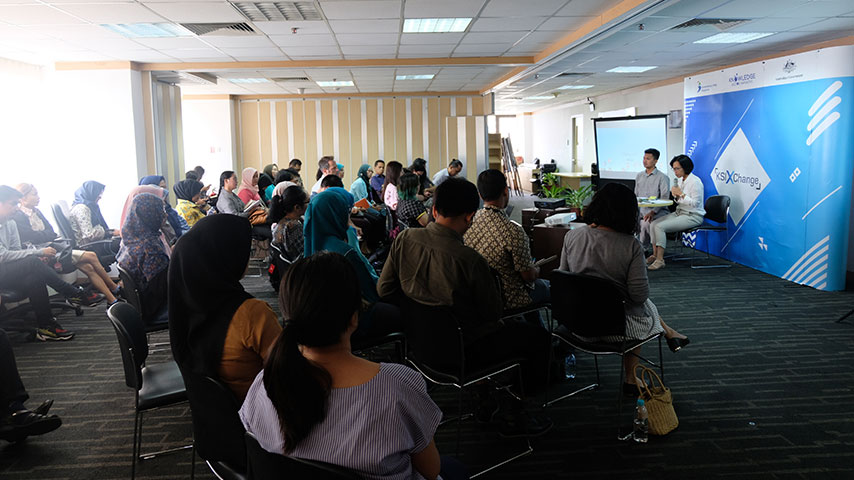Severity: 8192
Message: Methods with the same name as their class will not be constructors in a future version of PHP; MY_Lang has a deprecated constructor
Filename: core/MY_Lang.php
Line Number: 16

Good research can help produce public policies that meet community needs. Inclusive policy needs to be based on good practices and research that involves persons with disabilities. This means that persons with disabilities are not simply the objects of research, but are engaged in initiating and formulating policies.
“Research that does not involve persons with disabilities is often criticised for not providing relevant information about how to formulate appropriate policies,” said Dina Afrianty, a Research Fellow at La Trobe University and co-founder of the Australia-Indonesia Disability Research and Advocacy Network (AIDRAN) during a KSIxChange discussion entitled ‘Making Research Inclusive: Listening to the Voices of People with Disability’ on Thursday, 17 January 2019.
The discussion aimed to promote more inclusive research practices and improve the use of evidence on gender inclusion and social inclusion issues in development policymaking.
Research regarding persons with disabilities can be done by individuals as well as teams. To ensure that the results are relevant, according to Dina, individual research conducted by persons without disabilities should focus on policies and behaviours or social attitudes toward persons with disabilities.
For research conducted by teams, Dina suggested that it was important for all researchers, with or without disabilities, to have a shared understanding. Research team leaders need to ensure there is no peer pressure between researchers working in teams. They should also ask researchers to reflect on their experiences in interacting with research subjects in the field.
“These different experiences can enrich the research findings and point to areas for deeper exploration,” said Dina.
Inclusive research is usually participatory or ethnographic. One method for such research is nominal group technique. This method allows research informants to be more equal and encourages less active informants to speak up and share their opinions.
Bias is a common issue in all types of research. To avoid bias, Slamet Thohari, a lecturer at Brawijaya University and Secretary of the Centre for Disability Studies and Services, argued that persons with disabilities need to be encouraged to become policy researchers themselves. This will help ensure that research better reflects the perspectives and experiences of persons with disabilities.
He suggested that quantitative researchers validate findings with persons with disabilities to minimise bias. Other ways of averting bias in qualitative as well as quantitative research is by the researcher communicating the research context and his/her own position. The research objectives must also be shared to informants to ensure that they understand the context more clearly.

Funding and Capacity Building for Researchers
Inclusive research is not simply about encouraging persons with disabilities to do research on disability issues. Slamet Thohari, who goes by the nickname Amex, says that persons with disabilities can conduct research on any issue. Capacity building for researchers with and without disabilities is the same: there is no need to differentiate them.
“Disability is the interaction between a person’s impairment and barriers to equal participation. When we remove these barriers, persons with disabilities can participate equally,” says Amex.
To increase the number of researchers with disabilities, it is not enough for the government to provide special education in universities. Currently, persons with disabilities make up only one percent of students in higher education. To encourage greater participation, he suggested increasing the number of higher education scholarships for persons with disabilities and providing more inclusive campus infrastructure.
Dina added that capacity building for persons with disabilities to undertake research would help address marginalisation.
In addition to capacity building, funding is also needed to scale up inclusive research involving persons with disabilities. Dina suggested that Indonesia could learn from Australia’s National Disability Insurance Scheme. This scheme includes funding for research on disabilities.
“Persons with disabilities in Australia can get funding to do research,” says Dina.
To support more inclusive development policies, KSI is working with the Government of Indonesia to improve the use of evidence in policymaking. This includes bringing together research institutions and government agencies to improve the quality of research, increase access to data and improve policy analysis.**